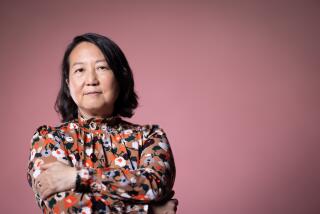Seoul Opens Office in L.A. to Promote Trade
- Share via
In a historic step to strengthen economic and cultural ties between Los Angeles and Seoul, the mayor of the South Korean capital is opening an outreach office in Los Angeles today, the first such facility outside Asia.
“The two cities have much in common and a tremendous potential to work together for mutual benefit,” said Seoul Mayor Cho Soon, who will inaugurate the Seoul Information Center, at 4801 Wilshire Blvd., this afternoon, with Mayor Richard Riordan and scores of local and state officials on hand.
“In an age of globalization, relationships between cities become more important than ever because the role of central governments decreases,” Cho said in an interview. “What happens in Seoul and other parts of northeast Asia affects Los Angeles and California.”
California is South Korea’s fourth-largest trading partner, after Japan, Canada and Mexico.
Tonight, to celebrate the center’s opening, Cho and his wife will host a reception with Korean entertainment at the Omni Hotel downtown. More than 1,100 people from the worlds of politics, business and academia have been invited.
The relationship between Los Angeles and Seoul goes back nearly a century, when Korean pioneers first settled here.
Today, Los Angeles has more Koreans than anywhere outside Asia. A majority of the more than 400,000 Koreans in Southern California hail from Seoul, a city of 11 million.
Cho, an economist with a doctorate from UC Berkeley, expressed the hope that the Seoul City Hall annex in Los Angeles will serve as an important two-way forum to exchange information on a number of subjects.
“We have much to learn from each other,” he said.
The outreach office here will offer a variety of materials covering an array of subjects in print, video and through a computerized retrieval system, which will be backed up by resources in South Korea, officials said.
Cho said his office would like to assist small- and medium-size enterprises in Seoul with marketing products in the United States because they are handicapped by a lack of information. By the same token, he hopes his center will be useful to American businesses that are looking to establish business connections in Seoul.
“Most people outside Korea only know about the big companies such as Hyundai, Samsung or Daewoo,” he said, “but the backbone of the South Korean economy consists of small- and medium-size businesses.”
On Monday, Cho was the host at a meeting of Korean businessmen and their Los Angeles counterparts. He also visited subway construction sites. Traffic jams are a major problem in Seoul, which has 2 million cars.
The mayor also said he is studying federal and state clean air and other environmental laws to use them as models for Seoul, where smog is worse than in Los Angeles.
Cho, recently named South Korea’s most popular politician in a public opinion survey, is an unusual public figure there.
Equally fond of Confucian classics and Shakespeare’s tragedies, Cho is a thoughtful man who believes that people of ability and social conscience should take part in public service.
At the age of 60, after two decades of teaching economics at the prestigious Seoul National University, Cho accepted in 1988 a simultaneous appointment as deputy prime minister and minister of the Economic Planning Board, which sets South Korea’s economic policies.
“I went into government for one reason--for public service,” he said.
He was later tapped to run the Bank of Korea, perhaps the most influential financial position in the country.
Last year, when he was drafted by a major opposition party to run for mayor of Seoul, he could not turn it down, Cho said.
“I had to practice what I preached,” he said.
He won handily, becoming the first popularly elected mayor of Seoul in 35 years.
Cho said he shares with many Koreans at home and abroad the embarrassment of seeing two former presidents--Chun Doo-Hwan and Roh Tae-Woo--in jail for receiving bribes and abusing of power.
But he expressed the hope that as democracy takes root in South Korea, after three decades of military rule, the importance of integrity in public and private lives will take hold.
What happened to the two corrupt leaders may not change the course of the South Korean body politic right away, he said, but there is a lesson to be learned from their fall.
That lesson is to make democracy work, he said. Toward that end, South Koreans individually as well as collectively need to think about what democracy really means and practice it.
Americans have a stake in what happens in Seoul and the rest of Asia, too, he said.
Cho leaves Wednesday afternoon for the Bay Area to deliver a speech at UC Berkeley, following a morning meeting with Riordan.
More to Read
Inside the business of entertainment
The Wide Shot brings you news, analysis and insights on everything from streaming wars to production — and what it all means for the future.
You may occasionally receive promotional content from the Los Angeles Times.










